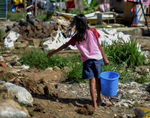Echoes in the press
|
Source: . Published on Fri, 2017-03-24 00:00
Alla vigilia del Vertice di Roma, occasione in cui i Leader dei Paesi UE si apprestano a celebrare il sessantesimo anniversario dei Trattati di Roma e discutere del futuro dell’UE, oltre 7.000 organizzazioni della società civile hanno inviato una lettera congiunta ai leader dei 10 Paesi Membri impegnati da tre anni nel negoziato per l’introduzione di una Tassa europea sulle Transazioni Finanziarie (TTF). Il futuro dell’UE passa anche dall’adozione di misure come questa che rappresentano una risposta concreta alle istanze dei cittadini sempre più schiacciati da politiche che privilegiano il potere di pochi a discapito del benessere di tutti. |
|
Source: . Published on Wed, 2017-03-08 00:00
C’est un phénomène que l’on constate partout en Europe et qui s’avère tout aussi inquiétant en République tchèque, pays où les inégalités salariales entre hommes et femmes sont parmi les plus marquantes à l’échelle européenne : les femmes tchèques sont deux fois plus exposées au risque de tomber dans la pauvreté que les hommes. Cet écart est particulièrement marqué chez les personnes âgées et les familles monoparentales, comme le constate dans son rapport publié à l’occasion de la Journée internationale des femmes, la branche tchèque de la plate-forme Social-Watch. |
| Source: . Published on Wed, 2017-03-08 00:00 |
|
Source: . Published on Tue, 2017-03-07 17:43
Ženám v Česku hrozí chudoba mnohem víc než mužům. Nejvíc ohrožené jsou samoživitelky s dětmi a seniorky, které zůstaly samy. Velký problém dál představuje i násilí vůči ženám. Výsledky výroční zprávy o rovnosti pohlaví zveřejnila v úterý česká koalice mezinárodní sítě Social Watch při příležitosti Mezinárodního dne žen. |
|
Source: . Published on Tue, 2017-03-07 17:43
Tato slova zaznívají v jedné výrazné scéně jednoho proslulého normalizačního propagandistického seriálu (lze přitom jen doporučit jisté kreativní využití této scény...). |
|
Source: . Published on Sat, 2016-12-31 00:00
As many of our friends and affiliates know, Global Action’s lens on peace and security has broadened over the years, moving beyond weapons to what many diplomats at the UN refer to as the “root causes” of conflict — from persistent poverty and habitat loss to climate impacts and discrimination based on ethnicity, gender and religion. Security question permeate (or should) much of what the UN does, including the provision of humanitarian assistance, the health of our oceans, the political enfranchisement of youth and the protection of children in conflict zones. |
Published on Tue, 2016-11-01 23:00
A global alliance of civil society organisations (CSOs) and networks on 24 October presented a report assessing the implementation of the 2030 Agenda for Sustainable Development, as well as highlighting some of the structural obstacles and challenges to its achievement. The CSOs that came together under the Reflection Group on the 2030 Agenda for Sustainable Development comprised the Arab NGO Network for Development (ANND), Development Alternatives with Women for a New Era (DAWN), Social Watch, Third World Network (TWN), and Global Policy Forum (GPF). They were supported by the Friedrich-Ebert-Stiftung (FES). |
Published on Fri, 2016-10-28 18:12
When asked about how countries are implementing the 2030 Agenda and the obstacles encountered, civil society groups and coalitions affiliated with Social Watch around the world generally agree that their governments recognize the political weight of the new international consensus. Yet, many difficulties of different nature are identified in different countries, and a lot of them are related to finances. “With reference to the 2030 Agenda, there are progress and setbacks,” writes Héctor Béjar on behalf of the Social Watch coalition in Peru. “GDP grew, but inequality grew as well. The mafias that exploit drug trafficking, illegal mining and smuggling continued to concentrate wealth, which then left the country through profits of foreign companies that enjoy lower taxes than national companies. Monetary poverty of less than USD 1.25 a day has declined, but multidimensional poverty has risen to critical levels. Maternal and infant mortality were reduced, but the anemia of women and children, unwanted and premature adolescent pregnancies and deaths from abortion and postpartum hemorrhage have remained.” |
Published on Wed, 2016-10-05 09:41
Three years after the typhoon destroyed more than a million homes and killed 6,000 people, the Philippines has fallen far short on house-building pledge. When Typhoon Haiyan smashed into the city of Tacloban in the central Philippines almost three years ago, Arsenio was one of the lucky ones – he survived by swimming a kilometre to safety. “Every time there is a storm, I get scared, even after three years,” he said. “I don’t want to go through the same thing again.” |
|
Source: . Published on Mon, 2016-10-03 00:00
Three years after the typhoon destroyed more than a million homes and killed 6,000 people, the Philippines has fallen far short on house-building pledge. |
SUSCRIBE TO OUR NEWSLETTER












